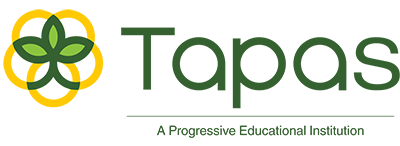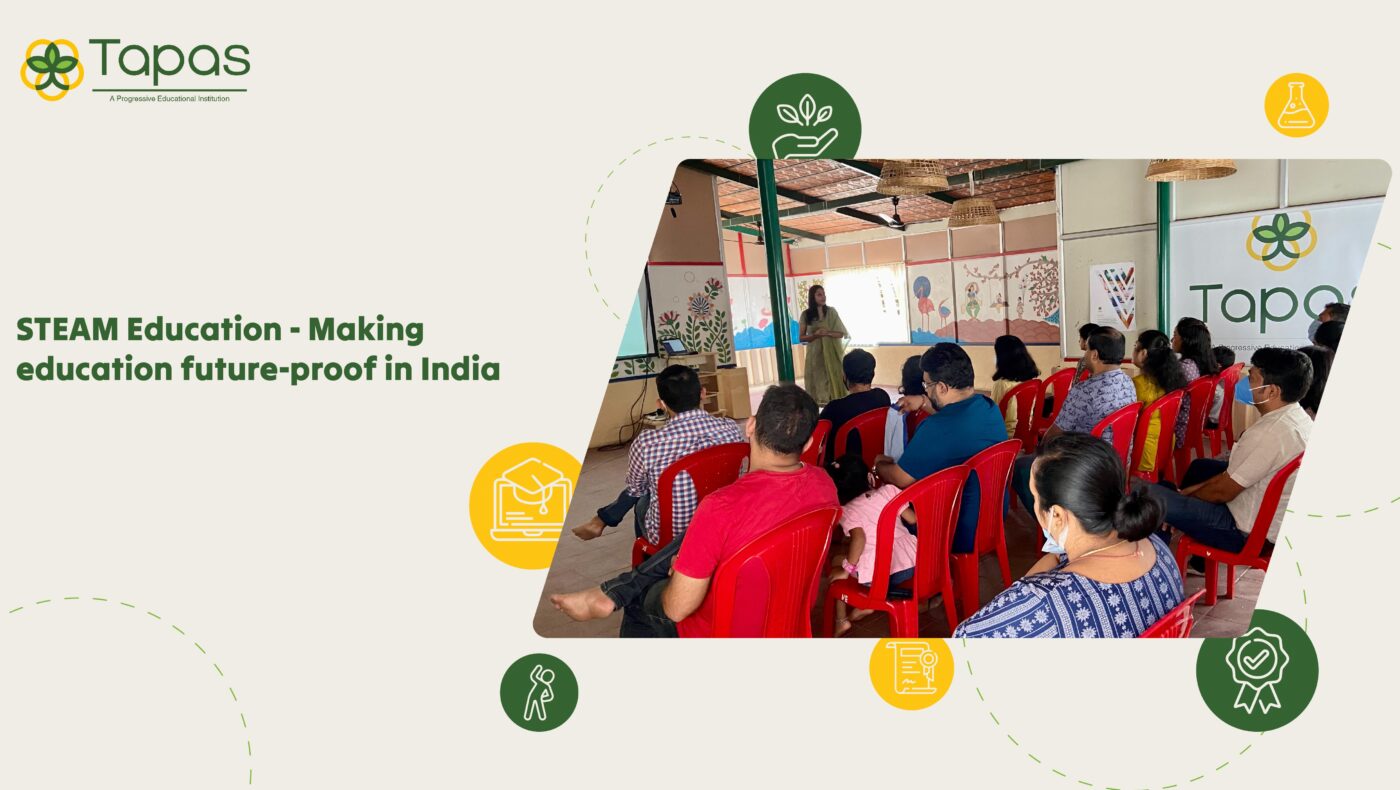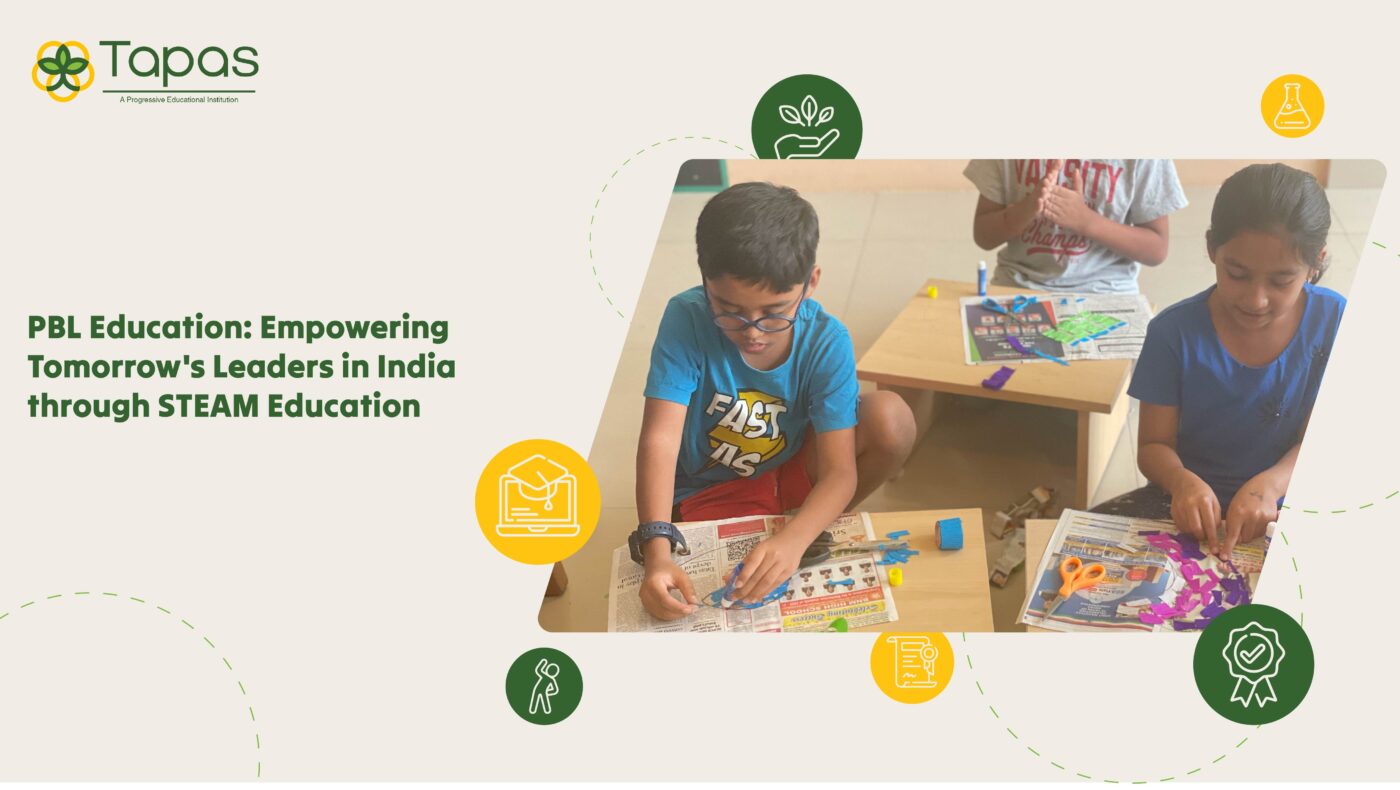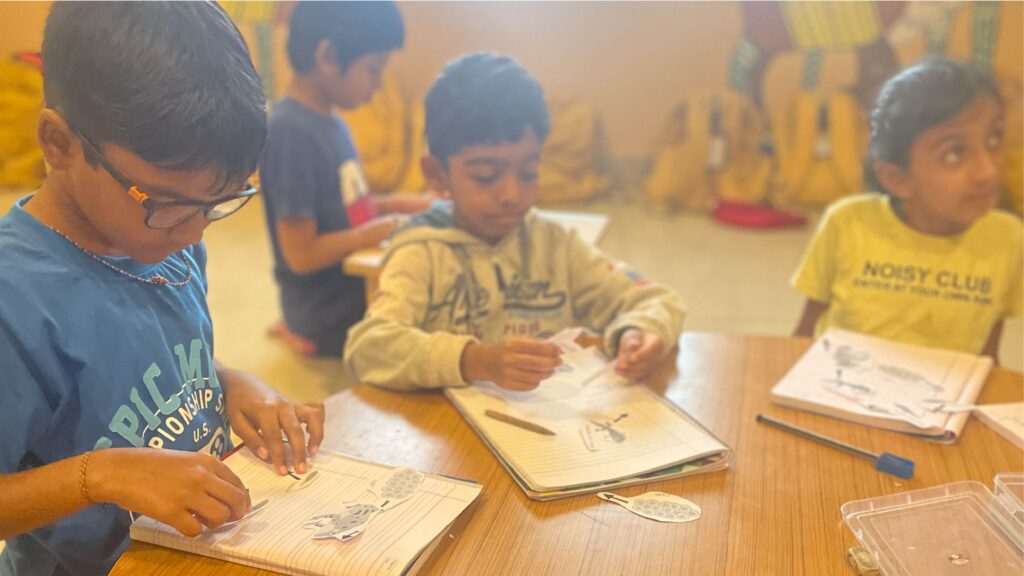STEAM Education – Making Education Future Proof in India
In an ever-evolving world, traditional educational approaches no longer suffice in preparing students for the dynamic landscape of tomorrow. The need for adaptable, forward-thinking, and well-rounded individuals has given rise to STEAM education (Science, Technology, Engineering, Arts, and Mathematics). By incorporating active learning techniques and fostering student-centered learning, STEAM education not only equips students with technical skills but also nurtures their creativity and problem-solving abilities. In India, where the demand for careers in STEAM fields continues to grow, embracing STEAM education is a crucial step towards making our educational system future-proof. To explore the transformative power of STEAM education in India, visit Tapas Education.
Basic Points that reveal the importance of PBL
- STEAM: Acronym for Science, Technology, Engineering, Arts, and Mathematics.
- Interdisciplinary: Integrates various disciplines for a holistic learning experience.
- Fosters Critical Skills: Encourages problem-solving, creativity, and critical thinking.
- Real-World Relevance: Relates education to practical applications.
- Career Opportunities: Prepares students for in-demand STEAM careers.
- Innovation: Cultivates innovation and adaptability.
- Global Competitiveness: Equips students for the global job market.
- Hands-On Learning: Emphasizes active and experiential learning.
- Diversity and Inclusion: Encourages a diverse range of learners.
- Future-Proofing: Adapts education to changing technological landscapes.
The Need for STEAM in India
In today’s job market, skills and knowledge in Science, Technology, Engineering, Arts, and Mathematics (STEAM) are in high demand. STEAM education focuses on equipping students with the expertise and qualities needed to thrive in this dynamic landscape. Active learning techniques and student-centered approaches enhance problem-solving, creativity, and critical thinking skills, which are essential for careers in STEAM fields. By engaging students in hands-on experiences, STEAM education prepares them for real-world challenges. It cultivates innovation, adaptability, and interdisciplinary collaboration, ensuring that graduates are not only job-ready but also poised to shape the future. STEAM is the key to staying competitive and future-proofing education.
Challenges in Traditional Education
Rote learning and outdated curriculums have long been prevalent in the Indian education system. These traditional methods often prioritize memorization over comprehension and discourage critical thinking. This approach can hinder students’ ability to apply their knowledge to real-world situations, particularly in STEAM fields. Active learning techniques and student-centered learning, core principles of STEAM education, address these limitations by encouraging practical problem-solving, creativity, and collaboration. By embracing STEAM, India can revitalize its education system, preparing students to excel in careers where adaptability, innovation, and interdisciplinary skills are essential. STEAM education fosters a generation of thinkers, innovators, and problem solvers, making education truly future-proof.
Benefits of STEAM Education
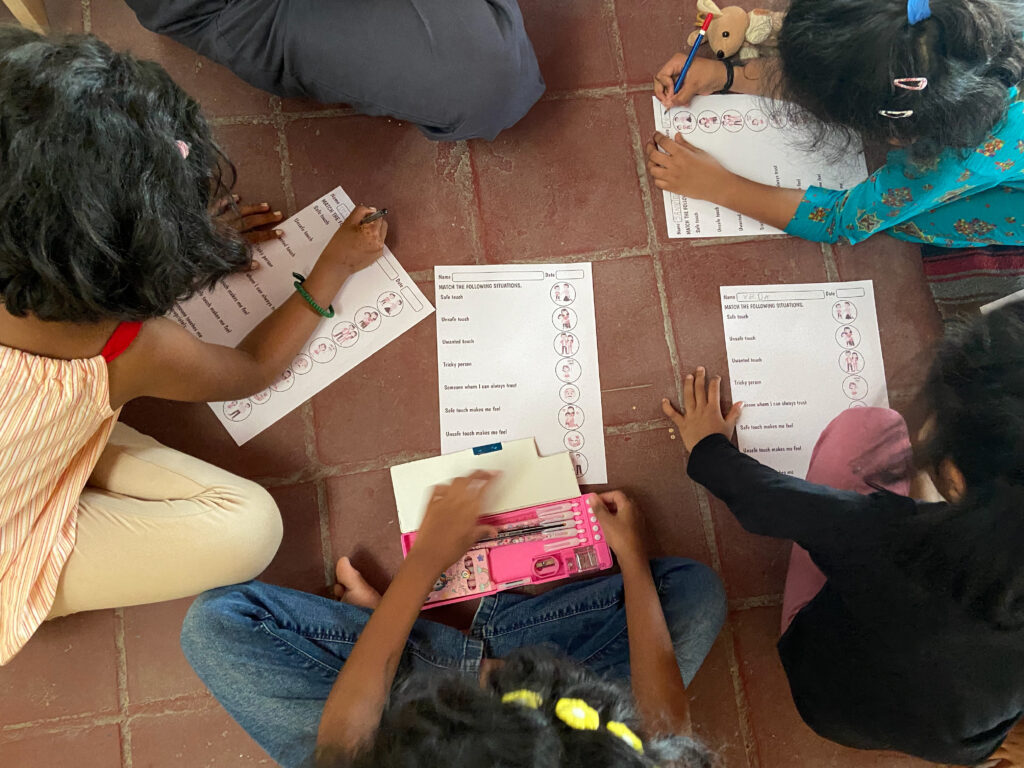 STEAM education cultivates critical thinking, problem-solving, and creativity by integrating science, technology, engineering, arts, and mathematics into a cohesive learning framework. Students are encouraged to explore complex problems, design experiments, and apply mathematical concepts to real-world scenarios. The arts component adds a creative dimension, fostering innovative thinking and expression. Through hands-on projects and experiments, students develop a deep understanding of subjects and learn to approach challenges with curiosity and confidence. STEAM nurtures well-rounded individuals who are not only knowledgeable but also equipped to tackle the dynamic, multifaceted challenges of the modern world, ensuring their education remains relevant and future-proof.
STEAM education cultivates critical thinking, problem-solving, and creativity by integrating science, technology, engineering, arts, and mathematics into a cohesive learning framework. Students are encouraged to explore complex problems, design experiments, and apply mathematical concepts to real-world scenarios. The arts component adds a creative dimension, fostering innovative thinking and expression. Through hands-on projects and experiments, students develop a deep understanding of subjects and learn to approach challenges with curiosity and confidence. STEAM nurtures well-rounded individuals who are not only knowledgeable but also equipped to tackle the dynamic, multifaceted challenges of the modern world, ensuring their education remains relevant and future-proof.
Successful STEAM Programs
In India, several schools and institutions are leading the way in implementing effective STEAM education. For instance, the Tapas Educational Institute is at the forefront of promoting active learning techniques and student-centered education through its innovative STEAM programs. Other notable examples include the Agastya International Foundation, which brings hands-on science education to underserved students, and the Dhirubhai Ambani International School in Mumbai, known for its integrated approach to technology and design thinking. These initiatives are preparing the next generation for careers in STEAM fields, fostering creativity and problem-solving, and making education future-proof in the ever-evolving landscape. Visit https://tapaseducation.com/ for more information.
Government Initiatives
Government programs play a vital role in promoting STEAM education in India. Initiatives like Atal Tinkering Labs, launched under the Atal Innovation Mission, encourage hands-on learning and innovation among students. Similarly, the Rashtriya Avishkar Abhiyan fosters scientific temper and curiosity, integrating science and mathematics into everyday education. Additionally, the Skill India program is equipping the youth with practical skills relevant to STEAM careers. These government efforts aim to bridge the gap between traditional education and the evolving job market, ensuring that students are well-prepared for careers in STEAM fields, ultimately making education in India future-proof.
Teacher Training
Well-trained educators are the backbone of effective STEAM education. Their proficiency in Active Learning Techniques and Student-Centered Learning is pivotal in nurturing students’ curiosity and critical thinking. They play a vital role in creating an engaging environment that fosters a love for Science, Technology, Engineering, Arts, and Mathematics. Additionally, well-prepared educators can bridge the gap between theory and practical application, making STEAM subjects more relatable. As mentors, they guide students toward careers in STEAM, helping them develop the skills necessary for the jobs of the future. Thus, investing in educator training is an investment in the future of education and careers in STEAM.
Equal Access to STEAM
Inclusivity and accessibility are cornerstones of effective STEAM education. Employing Active Learning Techniques and Student-Centered Learning, educators ensure that every student, regardless of background or ability, has equal opportunities to excel in Science, Technology, Engineering, Arts, and Mathematics. By embracing diversity, STEAM education can tap into a broader talent pool and enrich the learning experience. This not only prepares students for careers in STEAM but also fosters an environment where innovation and creativity thrive. Inclusivity ensures that everyone can contribute to and benefit from the advancements that STEAM fields have to offer, creating a more equitable and prosperous future.
Parental Involvement
Parents play a pivotal role in nurturing their children’s interest in STEAM subjects at home. To support and encourage STEAM learning, they can:
- Provide Resources: Stock up on STEAM-related books, kits, and online learning platforms.
- Hands-On Activities: Engage in hands-on experiments and projects as a family.
Ask Questions: Encourage curiosity by asking open-ended questions about the world. - Field Trips: Visit science museums, art galleries, and tech exhibitions.
Mentorship: Connect kids with mentors or experts in STEAM fields. - Embrace Failure: Teach resilience, as failure is part of the learning process.
Celebrate Curiosity: Praise your child’s inquisitiveness and celebrate their achievements.
By fostering a love for STEAM at home, parents can help prepare their children for successful careers in these fields.
Future Prospects
STEAM education equips students with the skills and knowledge vital for future careers in India’s evolving job landscape. Active learning techniques and student-centered approaches in STEAM foster creativity, problem-solving, and critical thinking. These skills are highly sought-after in careers such as technology, engineering, healthcare, and the arts. As India shifts towards a knowledge-based economy, STEAM graduates are better prepared for opportunities in cutting-edge industries, innovation, and entrepreneurship. A STEAM-focused education not only enriches the learning experience but also empowers students to adapt and thrive in a rapidly changing job market, making them well-poised for success in diverse careers.
ISRO’s aspiring plans, including a manned Moon mission by 2040, offer an incredible opportunity for students engaged in project-based learning. This exciting venture can serve as a real-world, inspirational project idea. Students can explore the technical, scientific, and logistical challenges involved in sending humans to the Moon, fostering creativity and problem-solving skills. They can delve into areas like spacecraft design, life support systems, and lunar exploration technology, aligning their projects with ISRO’s vision. This initiative not only sparks curiosity but also encourages the next generation to consider careers in space exploration, paving the way for India’s continued success in space science.
- Among the most exciting proposals is a manned mission to the Moon, anticipated around 2040.
- This mission represents a significant leap in ISRO’s space exploration efforts.
- It will involve sending Indian astronauts to the lunar surface, marking a historical achievement.
- The plans also include missions to other celestial bodies, like Mars and Venus.
- ISRO’s agenda showcases a commitment to advancing space science and technology.
- These initiatives provide numerous opportunities for scientific research and technological innovation.
- ISRO’s ambitious plans inspire future scientists and engineers, offering exciting prospects for students and professionals.
Conclusion
In the pursuit of shaping a brighter future, STEAM education in India stands as a beacon of hope, driving the transformation of traditional learning. Active learning techniques and student-centered approaches offered by STEAM education pave the way for innovation and excellence. As we nurture the leaders and creators of tomorrow, it’s crucial to embrace this holistic approach to learning. To embark on this journey of exploration and growth, visit https://tapaseducation.com/ and empower the learners of today with the tools and knowledge needed for the challenges and opportunities of tomorrow. Join us in making education not only future-proof but also filled with endless possibilities. Your adventure in STEAM education begins here.
